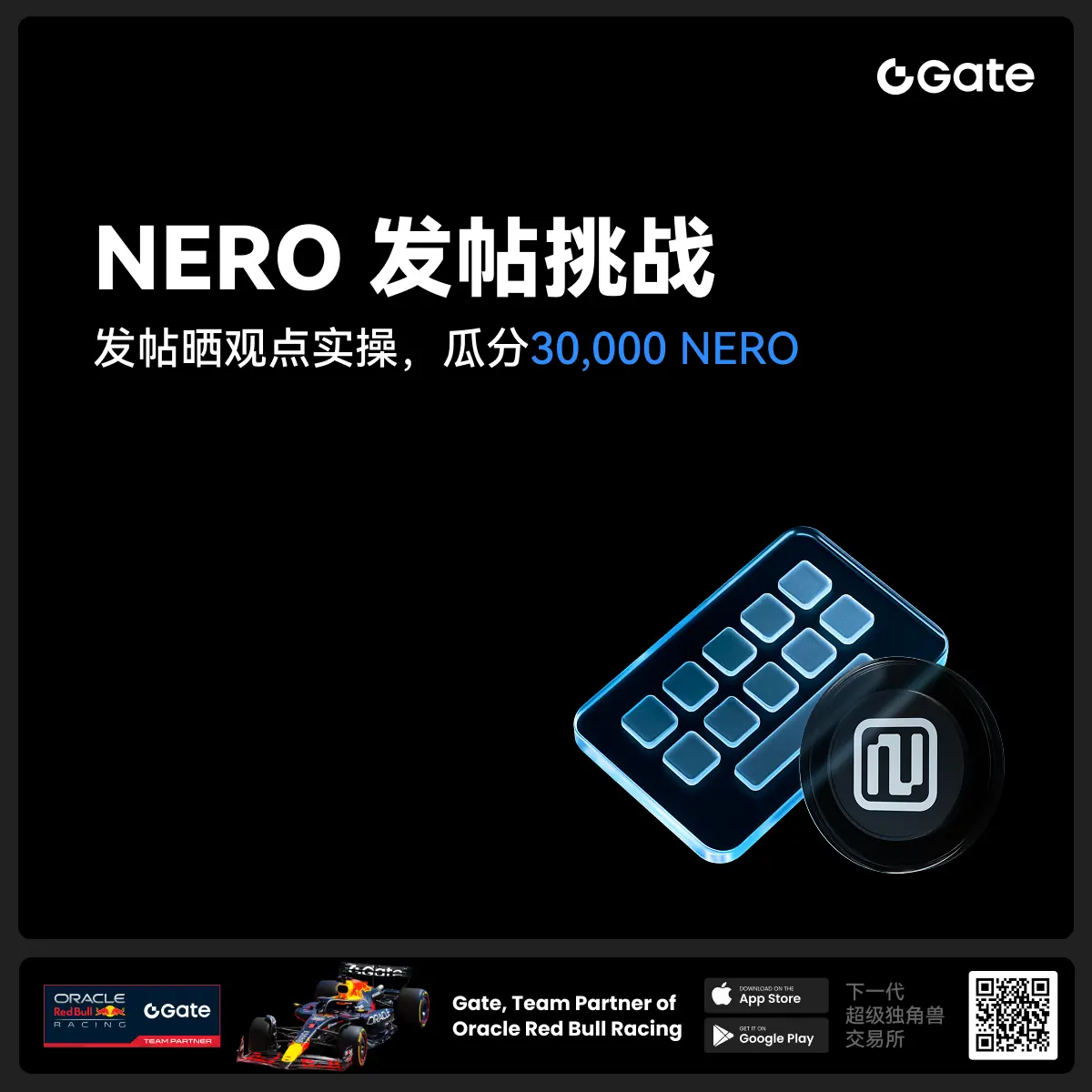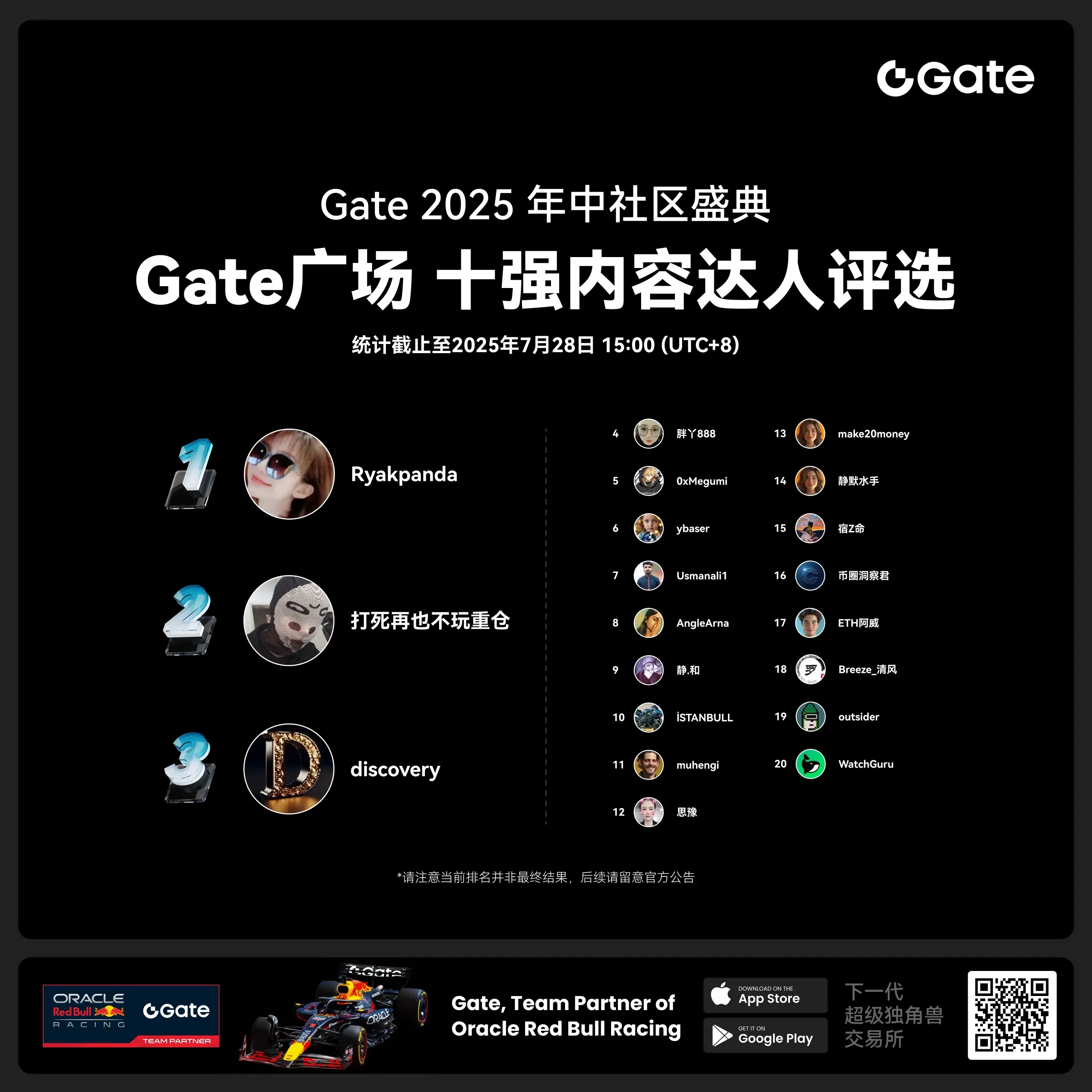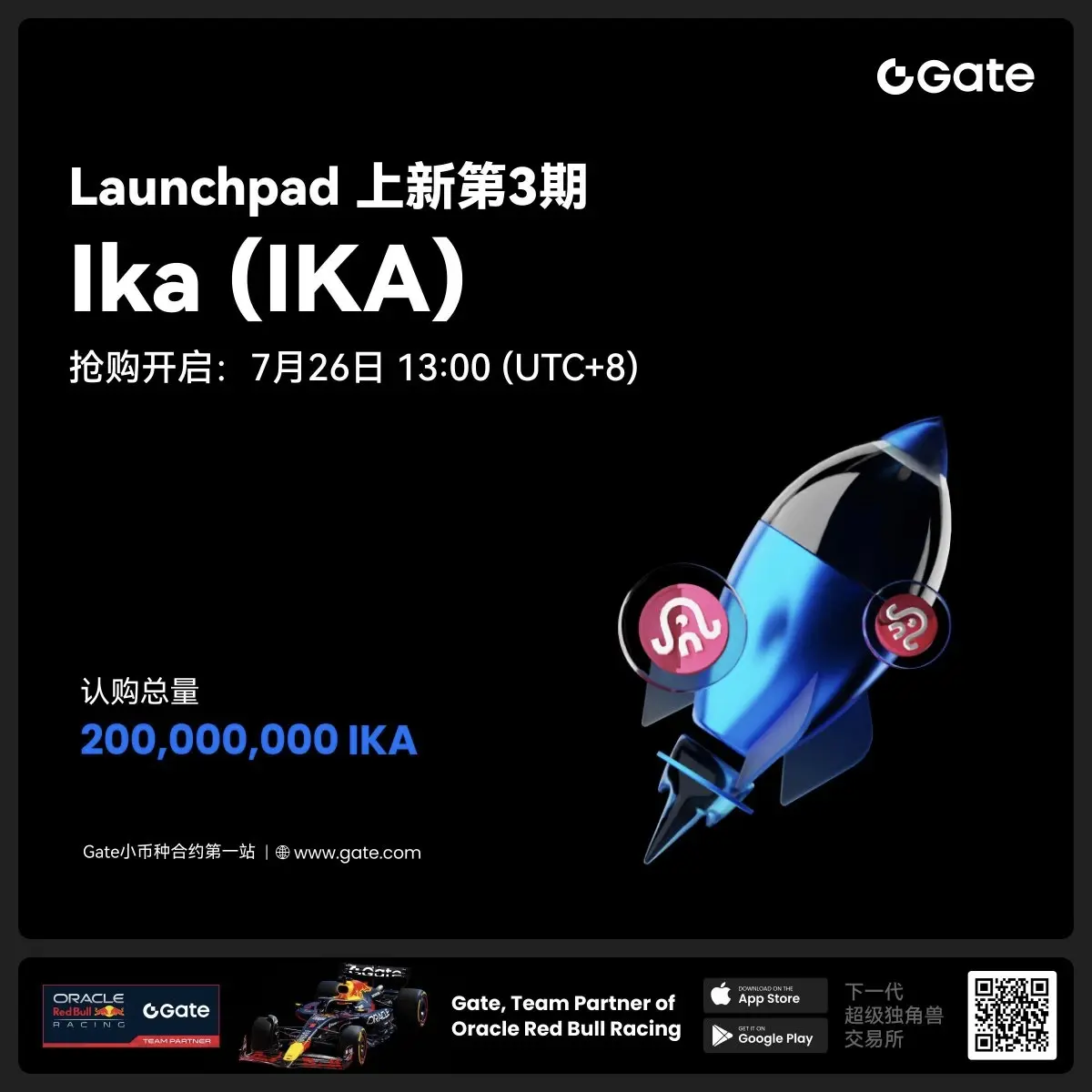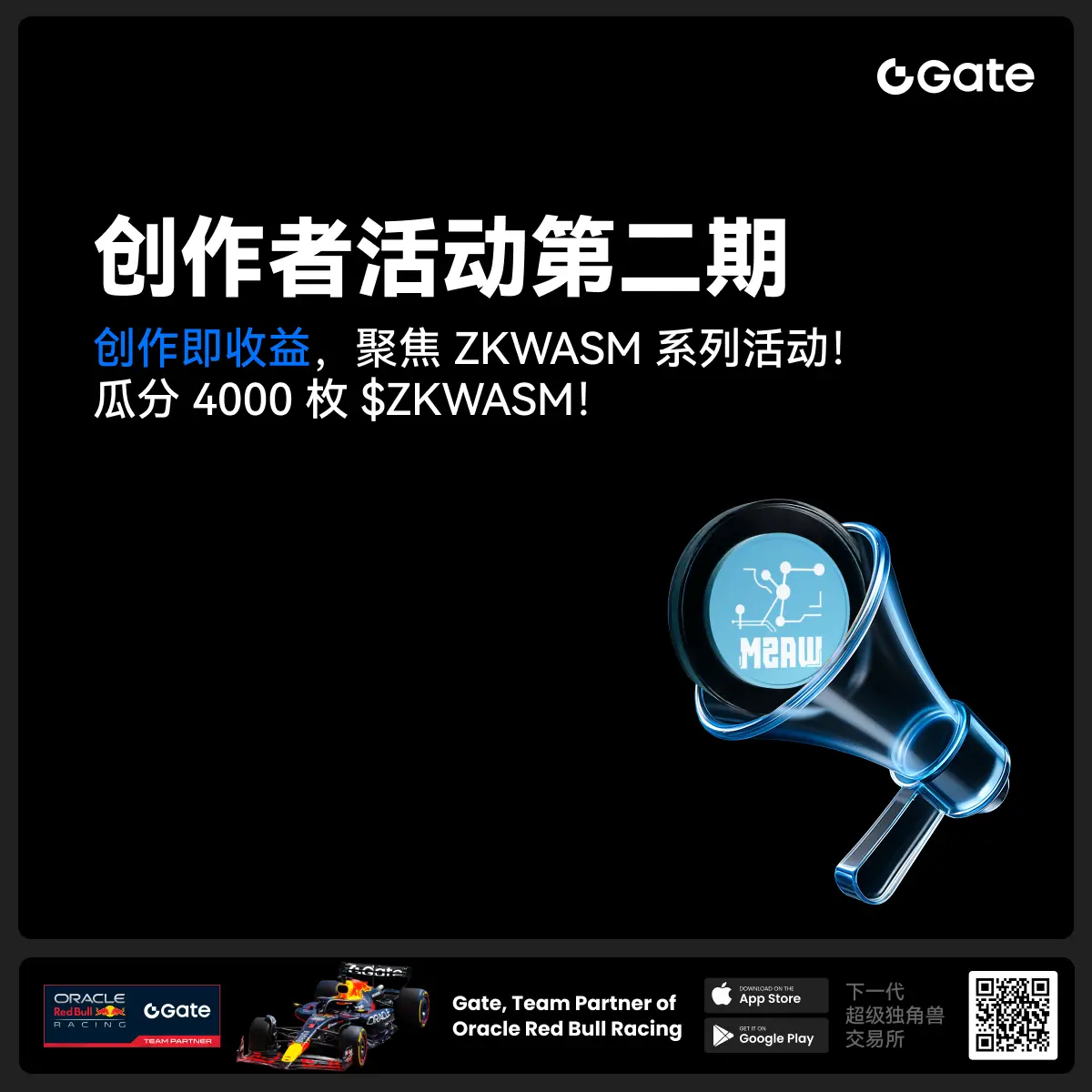- 話題1/3
6298 熱度
55082 熱度
8677 熱度
18830 熱度
701 熱度
- 置頂
- 📢 Gate廣場 #NERO发帖挑战# 秀觀點贏大獎活動火熱開啓!
Gate NERO生態周來襲!發帖秀出NERO項目洞察和活動實用攻略,瓜分30,000NERO!
💰️ 15位優質發帖用戶 * 2,000枚NERO每人
如何參與:
1️⃣ 調研NERO項目
對NERO的基本面、社區治理、發展目標、代幣經濟模型等方面進行研究,分享你對項目的深度研究。
2️⃣ 參與並分享真實體驗
參與NERO生態周相關活動,並曬出你的參與截圖、收益圖或實用教程。可以是收益展示、簡明易懂的新手攻略、小竅門,也可以是行情點位分析,內容詳實優先。
3️⃣ 鼓勵帶新互動
如果你的帖子吸引到他人參與活動,或者有好友評論“已參與/已交易”,將大幅提升你的獲獎概率!
NERO熱門活動(帖文需附以下活動連結):
NERO Chain (NERO) 生態周:Gate 已上線 NERO 現貨交易,爲回饋平台用戶,HODLer Airdrop、Launchpool、CandyDrop、餘幣寶已上線 NERO,邀您體驗。參與攻略見公告:https://www.gate.com/announcements/article/46284
高質量帖子Tips:
教程越詳細、圖片越直觀、互動量越高,獲獎幾率越大!
市場見解獨到、真實參與經歷、有帶新互動者,評選將優先考慮。
帖子需原創,字數不少於250字,且需獲得至少3條有效互動
- 🎉 親愛的廣場小夥伴們,福利不停,精彩不斷!目前廣場上這些熱門發帖贏獎活動火熱進行中,發帖越多,獎勵越多,快來GET你的專屬好禮吧!🚀
1️⃣ #GateLaunchpad上线IKA# |IKA認購體驗
在Gate廣場帶話題曬出你的IKA Launchpad認購體驗,4位幸運分享者講瓜分$200分享獎池!
詳情 👉️ https://www.gate.com/post/status/12566958
2️⃣ #ETH冲击4800# |行情分析預測
大膽發帖預測ETH走勢,展示你的市場洞察力!10位幸運用戶將平分0.1 ETH 獎勵!
詳情 👉️ https://www.gate.com/post/status/12322403
3️⃣ #创作者活动第二期# |ZKWASM話題
在廣場或推特發布與 ZKWASM 或其交易活動相關的原創內容,瓜分4,000枚ZKWASM!
詳情 👉️ https://www.gate.com/post/status/12525794
4️⃣ #Gate广场征文活动第二期# |ERA話題
談談你對ERA的觀點/體驗,參與並推廣活動,700 ERA大獎等你贏!
詳情 👉️ https://www.gate.com/post/status/12361653
5️⃣ #MBG任务挑战# |MBG話題
分享你對MBG的洞察,積極參與和推廣MBG活動,20位小 - 親愛的廣場用戶們, #Gate 2025年中社区盛典# 投票中!🔥
🙌 廣場內容達人TOP40榜單新鮮出爐!速速圍觀榜單,爲你喜愛的達人瘋狂打call吧:
www.gate.com/activities/community-vote
每天完成【廣場】互動任務可獲得助力值,每投出30助力值即可參與抽獎一次!
iPhone 16 Pro Max 512G、金牛雕塑、潮流運動套裝、合約體驗券、熱門幣種等你抽!
助力越多,中獎機率越大,下一個抱走iPhone 16的錦鯉就是你!🧧
別猶豫,帶上你的“歐氣”,爲達人衝榜贏大獎!
https://www.gate.com/announcements/article/45974
- 🎉 Gate 廣場 IKA Launchpad 發帖活動來襲!🎉
Gate Launchpad 認購 IKA 最後24小時!曬出你的認購體驗,和大家一起分享,每個人都有機會瓜分 $200 獎池!
🎁 4位幸運分享者*$50合約體驗券每人!
🧐 如何參與:
1.在廣場發帖,帶上 #GateLaunchpad上线IKA# 標籤
2.曬出你的認購截圖 或 分享你的獨特認購小竅門/心得或趣事
3.保證帖子大於50字,內容有趣有料,原創,集齊至少3個互動(點讚/評論/轉發)
IKA認購連結:https://www.gate.com/launchpad/2336?downgarde=true
活動時間:7月28日 12:00 - 7月30日 24:00 (UTC+8)
趕快加入,分享你的精彩時刻,你就是下一個幸運兒!
- 📢 Gate廣場 #创作者活动第二期# 正式開啓!
聚焦 ZKWASM 系列活動,分享你的觀點,瓜分 4,000 枚 $ZKWASM!
ZKWASM 作爲 zk 公鏈先鋒,正在 Gate 平台重磅推廣!
三大活動聯動上線:Launchpool 認購、CandyDrop 空投、Alpha 專屬交易——不要錯過!
🎨 活動一:發布廣場貼文,贏內容獎勵
📅 時間:7月25日 22:00 - 7月29日 22:00(UTC+8)
📌 參與方式:
- 在 Gate 廣場發布與 ZKWASM 或其三大活動相關的原創內容(不少於 100 字)
- 添加標籤: #创作者活动第二期# #ZKWASM#
- 附本人參與 Launchpool/CandyDrop/Alpha 的截圖(如認購、空投或交易)
🏆 獎勵設置:
- 一等獎(1名):1000 枚 $ZKWASM
- 二等獎(2名):500 枚 $ZKWASM
- 三等獎(10名):100 枚 $ZKWASM
📋 評選標準:內容質量、互動量、項目相關性,附活動參與截圖者優先。
📢 活動二:發推贏傳播力獎勵
📌 參與方式:
- 在 X(推特)發布與 ZKWASM 或三大活動相關的原創內容(不少於 100 字)
- 添加標籤: #ZKWASM # GateSquare
- 填寫登記表 👉 https://www.gate.com/quest
Pectra lets hackers drain wallets with just an offchain signature
Ethereum’s latest network upgrade, Pectra, introduced powerful new features aimed at improving scalability and smart account functionality — but it also opened a dangerous new attack vector that could allow hackers to drain funds from user wallets using only an offchain signature.
Under the Pectra upgrade, which went live on May 7 at epoch 364032, attackers can exploit a new transaction type to take control of externally owned accounts (EOAs) without requiring the user to sign an onchain transaction.
Arda Usman, a Solidity smart contract auditor, confirmed to Cointelegraph that “it becomes possible for an attacker to drain an EOA’s funds using only an offchain signed message (no direct onchain transaction signed by the user).”
At the center of the risk is EIP-7702, a core component of the Pectra upgrade. The Ethereum Improvement Proposal introduces the SetCode transaction (type 0x04), which enables users to delegate control of their wallet to another contract simply by signing a message.
If an attacker obtains this signature — say, via a phishing site — they can overwrite the wallet’s code with a small proxy that forwards calls to their malicious contract.
“Once the code is set,” Usman explained, “the attacker can invoke that code to transfer out the account’s ETH or tokens—all without the user ever signing a normal transfer transaction.”
Wallets can be altered with offchain signature
Yehor Rudytsia, onchain researcher at Hacken, noted that this new transaction type introduced by Pectra allows arbitrary code to be installed on the user’s account, essentially turning their wallet into a programmable smart contract.
“This tx type allows the user to set arbitrary code (smart contract) to be able to execute operations on the user’s behalf,” Rudytsia said.
Before Pectra, wallets could not be modified without a transaction signed directly by the user. Now, a simple offchain signature can install code that delegates complete control to an attacker’s contract.
“Pre-Pectra, users needed to send transaction (not sign message) to allow their funds to be moved… Post-Pectra, any operation may be executed from the contract which user approved via SET_CODE,” Rudytsia explained.
The threat is real and immediate. “Pectra activated May 7, 2025. From that moment, any valid delegation signature is actionable,” Usman warned. He added that smart contracts relying on outdated assumptions, such as using tx.origin or basic EOA-only checks, are particularly vulnerable.
Wallets and interfaces that fail to detect or properly represent these new transaction types are most at risk. Rudytsia warned that “wallets are vulnerable if they do not analyze Ethereum’s transaction types,” especially transaction type 0x04.
He emphasized that wallet engines must clearly display delegation requests and flag any suspicious addresses.
This new form of attack can be easily executed through common offchain interactions like phishing emails, fake DApps, or Discord scams.
“We believe it will be the most popular attack vector regarding these breaking changes introduced by Pectra,” Rudytsia said. “From now on, users have to carefully validate what they are going to sign.”
Hardware wallets are not safer anymore
Hardware wallets are no longer inherently safer, Rudytsia said. He added that hardware wallets from now on are at the same risk as hot wallets from the perspective of signing malicious messages. “If done—all the funds are gone in a moment.”
There are ways to stay safe, but they require awareness. “Users should not sign the messages they do not understand,” Rudytsia advised. He also urged wallet developers to provide clear warnings when users are asked to sign a delegation message.
Special caution should be taken with new delegation signature formats introduced by EIP-7702, which are not compatible with existing EIP-191 or EIP-712 standards. These messages often appear as simple 32-byte hashes and may bypass normal wallet warnings.
“If a message includes your account nonce, it’s probably affecting your account directly,” Usman warned. “Normal sign-in messages or offchain commitments don’t usually involve your nonce.”
Adding to the risk, EIP-7702 allows for signatures with chain_id = 0, meaning the signed message can be replayed on any Ethereum-compatible chain. “Understand it can be used anywhere,” Usman said.
While multisignature wallets remain more secure under this upgrade, thanks to their requirement for multiple signers, single-key wallets — hardware or otherwise — must adopt new signature parsing and red-flagging tools to prevent potential exploitation.
Alongside EIP-7702, Pectra also included EIP-7251, which raised Ethereum’s validator staking limit from 32 to 2,048 ETH, and EIP-7691, which increases the number of data blobs per block for better layer-2 scalability.
Magazine: Bitcoin eyes ‘crazy numbers,’ JD Vance set for Bitcoin talk: Hodler’s Digest, May 4 – 10